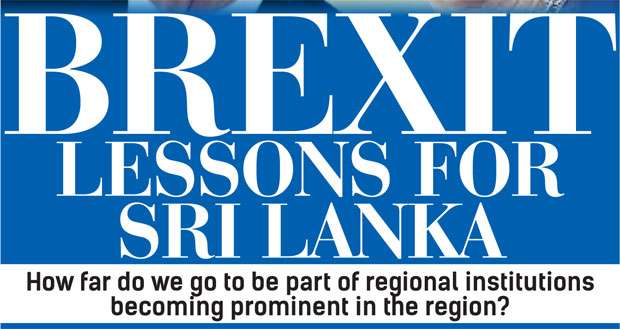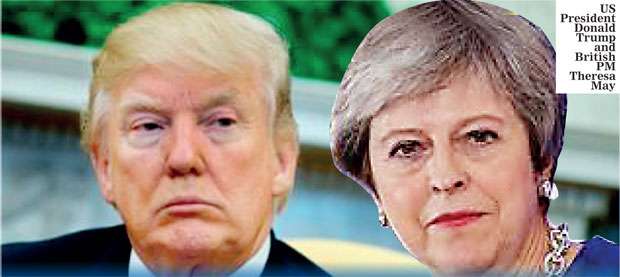Reply To:
Name - Reply Comment

 he two centres of Western powers are experiencing crises of policy decisions that were adopted in 2016.
he two centres of Western powers are experiencing crises of policy decisions that were adopted in 2016.
The simplistic narrative would be the desire for Trump administration to keep people out across the US Mexico border and for Britain under Cameron wanted to get out of the European Union. Both are huge political gambles and reaching their political high points as the two initiatives have become catalyst of a meltdown of governance in the United States and the Government in the United Kingdom
While the inner political battle for the federal funding for the Wall has triggered a significant Government shut down in the United States it has exacerbated the divide in the political ideological spectrum in the United States, the right wing and left wing opinion is on as fast-tracked polarization of the public, creating two strands of the far right and the far left, which will create political tensions that may harm social and political cohesion of the United States reversing its success story of a rainbow society.
Such politico ideological ruptures will have international implications where democracies in all parts of the world are being divided and radical groupings are politically activated. Sri Lanka in the last half decade is witnessing these polarizations across identity and populist politics which will be a key definitive factor in the political configuration of 2019.
The meltdown of the British Government of Theresa May is the focus of this analysis for many reasons, the article does not purely dwell on the Brexit as a phenomenon it looks at the unintended consequences Brexit will lead to beyond the condiments of the Eurozone not just as a process but bringing into question the viability and potency of regionalism and regional mechanisms globally for all aspiring projects of integration.
The EU was hailed as the epitome of the success story of regional integration, the way forward for a stronger, resilient and successful Europe and a powerful geopolitical bloc that could resist or be a bulwark against American Hegemony as well as any other Eurasian Power.
This vision of the EU has become troubled and problematized in the wake of the 2008 financial crises and the resulting political upheavals.
It has also witnessed the shocks of the breakup of the Middle East and its conflicts and new middle-eastern crisis post Arab Spring.
The unprecedented turning point for EU was the Brexit vote of June 2016, which triggered a process of Britain seeking terms of leaving the EU by 29 March 2019.
Britain ironically is coming to terms with the reality of the impossible win-win departure or even the prospect of a soft Brexit which means the benefits are greater than the costs. Yet it was the brainchild of the British lawmaker Lord John Kerr who was the chief architect of article 50 of the EU constitution, by design it made leaving the EU never beneficial to a divorcee.
"Second option for Sri Lanka is to actively be part of a new set of regional groupings that are emerging as a result of the new configuration of power in the region"
Britain’s political choices when it came to its global role has spawned many debates among historians and political scientists. More than 70 years back it was the choice to leave India that made Britain become the irrelevant empire, many blame the ruling elites who did not grasp the geopolitical costs of losing the empire that costed the British its primacy in the 20th Century.
Award-winning Indian novelist, Pankaj Mishra claims in a recent opinion piece that, “The Brexiteers, pursuing a fantasy of imperial-era strength and self-sufficiency, have repeatedly revealed their hubris, mulishness and ineptitude over the past two years.” It seems that come 21st Century Britain seems to be in a path where it is not just going through a Government meltdown, but it is going through a process that may seriously reduce its geopolitical importance and influence and make it scramble to make new connections and forced to live in the security shadow of France and the economic might of Germany.

The European Union is keen to use Britain as an example to send messages to all Euro-skeptics of the repercussions from a possible disengagement from the Union.
The imperative for the Union has always been the preservation of the single market. Thus, the exit of Britain has prompted the EU to make Britain suffer the consequences of leaving, it must pay a considerable amount of money to the EU, Britain will be pushed to accept the rights of European Union citizens within Britain. The recent defeat of Theresa May’s proposal, leaves Britain struggling to find an alternative plan when none is there with less than 10 weeks left before the deadline knowing very well that 40 per cent of its international trade relies on the EU.
 Over the last two years, a plethora of discussions took place in Sri Lanka among policymakers, industry leaders and economists about the potential and challenges of Brexit. Majority of this conversation were economic, financial and quantitative in nature. What we missed in Sri Lanka was a conversation on how Sri Lanka engages with the region and the larger geo-strategic region of Indo Pacific. In that context how far do we go to be part of regional institutions and mechanisms that are becoming prominent within the region? The first experiment of regional integration, the South Asian Association for Regional Cooperation (SAARC) seems to have died a natural death or has lost all economic and strategic relevance a good riddance in many ways as smaller powers in the SAARC had to concentrate more on how to manage the Indo Pak tensions ever since its inception.Thus, genuine South-South dialogue and the collaborative platform was never conceived, as the institution was deemed the weakest of the weak of regional mechanisms.
Over the last two years, a plethora of discussions took place in Sri Lanka among policymakers, industry leaders and economists about the potential and challenges of Brexit. Majority of this conversation were economic, financial and quantitative in nature. What we missed in Sri Lanka was a conversation on how Sri Lanka engages with the region and the larger geo-strategic region of Indo Pacific. In that context how far do we go to be part of regional institutions and mechanisms that are becoming prominent within the region? The first experiment of regional integration, the South Asian Association for Regional Cooperation (SAARC) seems to have died a natural death or has lost all economic and strategic relevance a good riddance in many ways as smaller powers in the SAARC had to concentrate more on how to manage the Indo Pak tensions ever since its inception.Thus, genuine South-South dialogue and the collaborative platform was never conceived, as the institution was deemed the weakest of the weak of regional mechanisms.
Yet, it seems weaker, flexible and more transparent regional mechanisms makes sense in a world that is not so keen on total integration and less interested in robust supranational governance structures.
There are two clear options for Sri Lanka, with one significant challenge. The clear option is increasing its bilateral relations, ironically bi literalism seems to be reduced in policy vision to manifest as Free Trade Agreements (FTAs).
While the FTAs are not totally bad, bilateral ties could be developed at multiple levels and working arrangements could be made in areas such as defence cooperation, education, civilizational linkages, tourism, logistics and infrastructure development.The second option for Sri Lanka is to actively be part of a new set of regional groupings that are emerging as a result of the new configuration of power in the region.
"Politico ideological ruptures will have international implications where democracies in all parts of the world are being divided and radical groupings are politically activated"
The only challenge being, that these regional groupings seem to be increasingly dominated by the geopolitical interest of rival regional powers.
The classic example is Bay of Bengal Initiative for Multi-Sectoral Technical and Economic Cooperation (BIMSTEC) which is a booming community of Southern Asian States with India as the driving force. Shanghai Cooperation Organization (SCO) is a new grouping which has common economic, security and political interests and is a Eurasian setting with China and Russia at its heart. Sri Lanka has space in both these institutions, yet when it comes for concrete actualization of the regional arrangement Sri Lanka may well be challenged by the dominant regional powers on how and what decisions are to be made and on whose interests.
The lesson from Brexit vote for Sri Lanka is two-pronged, domestic interests, citizen-centric governance has to be the heart of any policy decision when the country enters regional groupings, one major reason why the UK cannot go back to pre-Brexit situation was that there were genuine grievances among Britons that the EU was more interested in governments that made up the Union, not its people. Secondly, our foreign policy needs to calibrate multi-tiered engagement while negotiating the geopolitical compulsions of regional powers. Thus, we should work in groupings, be part of regional mechanisms as a stakeholder and never be a hostage.